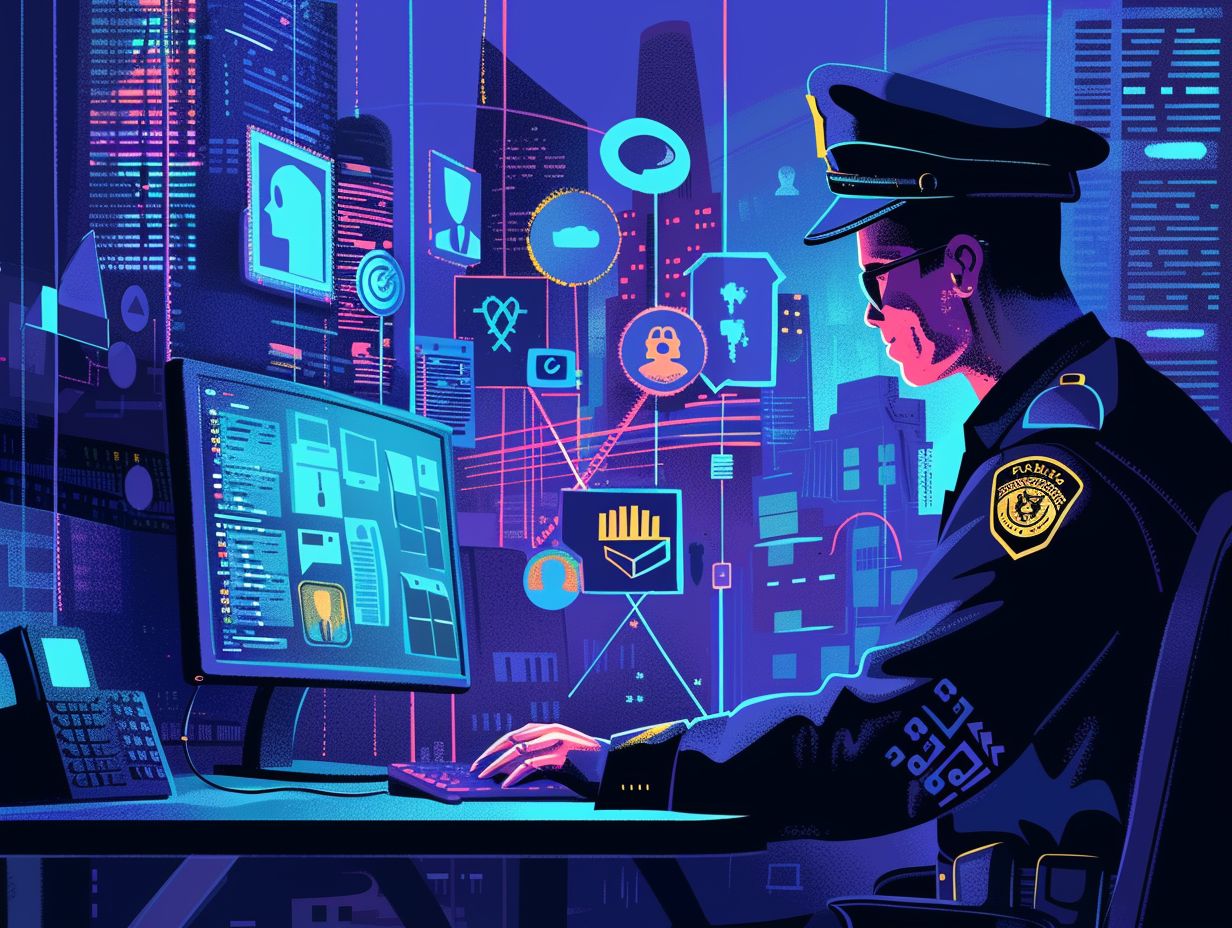Are you considering pursuing a challenging and fulfilling career in cybersecurity within law enforcement or intelligence agencies? This article offers an in-depth look at the field, outlining the specific roles and duties, necessary skills and qualifications, as well as the training and education essential for success.
It delves into the job prospects and potential salaries while also addressing the distinctive challenges and gratifications associated with a cybersecurity career in these specialized sectors. Discover how you can achieve personal and professional satisfaction in this dynamic and critical field.
Key Takeaways:

Overview of the Field
The field of cybersecurity encompasses a wide array of technical strategies and practices aimed at safeguarding sensitive information and systems from cyber threats. Professionals like Ade Muhammed, Beeson Cho, and Patricia M are at the forefront of this dynamic field, utilizing cutting-edge technologies to protect digital assets effectively.
Noteworthy figures in the cybersecurity arena, such as Anthony Wo and Bob Pardee, are renowned for their proficiency in threat intelligence and incident response. Given the rapid evolution of cyber threats, professionals like them play a vital role in proactively staying ahead of malicious actors.
Individuals interested in pursuing a career in cybersecurity have the opportunity to explore various options at upcoming events like the USAJOBS cybersecurity recruitment fair scheduled for Friday, May 10, 2024, and Sunday, May 12, 2024, at OPM. These events provide a platform to engage with industry experts, gain insights into the latest trends, and discover job opportunities within the field.
Roles and Responsibilities in Cybersecurity
Understanding the roles and responsibilities in cybersecurity is essential for maintaining a secure digital environment. Professionals such as Andrew R and Anastasia Edwards play critical roles in implementing technical strategies to combat cyber threats.
Specific Job Titles and Descriptions
In cybersecurity, certain job titles such as Security Analyst, Penetration Tester, and Network Security Engineer entail distinct responsibilities and technical approaches. Professionals like Rebecca Ford and Francisco Lugo demonstrate excellence in these positions, ensuring the digital security of organizations.
Cybersecurity professionals like Ben Yee and Anita Al play crucial roles within the field. For example, a Cybersecurity Consultant evaluates security protocols, formulates strategies, and provides recommendations to improve overall security posture. They collaborate closely with stakeholders to comprehend business requirements and align security goals accordingly.
On the other hand, an Incident Responder specializes in rapidly responding to security incidents, containing and mitigating threats. This role necessitates quick decision-making, technical proficiency, and the capability to perform effectively under pressure to protect essential digital assets.
Required Skills and Qualifications
To succeed in cybersecurity careers, you need a combination of technical and non-technical skills. Professionals such as Chris Bodill and Chuck Ballard demonstrate expertise in technical strategies as well as critical thinking and problem-solving abilities.
Technical and Non-Technical Skills

In the cybersecurity field, you must possess a combination of technical skills, such as coding, network security, and encryption, along with non-technical skills like problem-solving, communication, and risk assessment. Professionals such as Bob Pardee and Andrew R are exemplary in integrating both sets of skills to effectively address intricate cyber challenges.
Individuals within cybersecurity, like Anthony Wo and Ben Yee, exemplify how a solid foundation in technical strategies, combined with strong interpersonal skills, plays a vital role in combating security threats. For example, Anthony utilizes his expertise in coding and network security to identify system vulnerabilities, while his excellent communication abilities enable him to collaborate with diverse teams to implement robust security measures.
Similarly, Ben’s proficiency in encryption and risk assessment equips him to proactively anticipate potential cyber threats and devise innovative solutions to protect sensitive data.
Training and Education for Cybersecurity Careers
Training and education are essential for individuals who aspire to pursue careers in cybersecurity. Institutions provide academic programs and certifications specifically designed to equip professionals like you with the technical strategies necessary to excel in the field.
Academic Programs and Certifications
Academic programs and certifications have a crucial role in preparing individuals for cybersecurity careers. Specialized courses and certifications offered by institutions provide professionals like yourself with the necessary technical strategies and knowledge to effectively combat cyber threats.
These programs encompass a wide array of topics, such as network security, ethical hacking, cryptography, and incident response. By enrolling in these programs, you gain hands-on experience in implementing advanced defensive measures and analyzing security breaches. Professionals like David O and Harun Kuessner, who have successfully completed such programs, possess a deep understanding of identifying vulnerabilities and creating robust security protocols to protect sensitive information.
These certifications not only validate your expertise but also showcase your dedication to remaining informed about the latest cybersecurity trends and technologies.
Job Outlook and Salary Potential
The demand for cybersecurity professionals with advanced technical skills, such as those displayed by Rebecca Ford and Francisco Lugo, remains strong. Professionals like Andrew R and Anastasia Edwards, who play a crucial role in securing information, can expect competitive salary potential within the cybersecurity field.
Growth and Demand in the Field
The cybersecurity field is currently experiencing significant growth and a high demand for skilled professionals who are proficient in technical strategies to combat evolving cyber threats. Leading experts such as Ben Yee and Anita Al are actively involved in driving innovation and resilience within this dynamic industry.
The growing dependence on digital technologies and interconnected systems has heightened the necessity for cybersecurity specialists who not only possess technical expertise but also adaptive skills to navigate the rapidly changing landscape effectively. Professionals like Sue DeRosier and others have played a crucial role in shaping the industry by emphasizing the significance of continuous learning and proactive defense mechanisms.
Platforms such as USAJOBS have played a key role in facilitating the recruitment and placement of qualified professionals, thereby contributing significantly to the growth and development of the cybersecurity industry.
Potential Salary Ranges

In cybersecurity, you can expect competitive salary ranges that correspond to your expertise in technical strategies and risk mitigation. Professionals like Chris Bodill and Chuck Ballard command attractive salaries due to their proficiency in safeguarding digital assets.
You will notice a direct correlation between the complexity of your technical skills and the earning potential you unlock in this field. Factors such as industry experience, level of education, and certifications held like those by Sue DeRosier play a crucial role in establishing salary ranges. For instance, positions listed on USAJOBS may offer varying compensation structures, with roles that require specialized knowledge or high-level security clearances typically associated with higher pay scales. Understanding these dynamics can help aspiring cybersecurity professionals navigate towards lucrative career paths.
Challenges and Rewards of Cybersecurity Careers in Law Enforcement and Intelligence Agencies
Individuals pursuing cybersecurity careers in law enforcement and intelligence agencies are faced with distinctive challenges and fulfilling prospects that require proficiency in technical strategies. Professionals such as Andrew R and David O adeptly navigate these challenges with precision to uphold national security and maintain data integrity.
Unique Challenges and Opportunities
In the cybersecurity landscape, you face unique challenges and abundant opportunities to leverage technical strategies and innovation. Professionals like Chuck Ballard and Sue DeRosier excel in this dynamic environment, addressing emerging threats and fostering continuous improvement.
To thrive in this fast-paced industry, you must proactively stay ahead of cybercriminals who are constantly refining their tactics. Experts such as Francisco Lugo and Ben Yee showcase exceptional skills in mitigating threats and capitalizing on strategic opportunities. Their capacity to adapt to new technologies and forecast potential risks distinguishes them within the cybersecurity domain. By combining their technical expertise with strategic acumen, they play a pivotal role in safeguarding organizations against cyber attacks and ensuring the robust protection of sensitive data.
Personal and Professional Fulfillment
Achieving personal and professional fulfillment in cybersecurity requires a blend of technical expertise and a dedication to employing effective strategies. Professionals like Anita Al and Chris Bodill find fulfillment in safeguarding digital assets and contributing to a secure cyberspace.
By continuously honing your skills and staying abreast of the latest technological advancements, individuals in this field, such as Bob Pardee and Andrew R., derive immense satisfaction from the dynamic nature of cybersecurity work.
The challenge of staying two steps ahead of cyber threats and the sense of accomplishment in successfully thwarting potential breaches fuel their sense of purpose. The intrinsic reward of knowing you are playing a crucial role in protecting sensitive data and critical systems further solidifies your commitment to this ever-evolving and vital industry.
Frequently Asked Questions
What types of job roles are available in cybersecurity within law enforcement and intelligence agencies?

There are a variety of job roles available in the field of cybersecurity within law enforcement and intelligence agencies, including Cybersecurity Analyst, Cybercrime Investigator, Cybersecurity Engineer, and Digital Forensics Examiner.
What skills are necessary for a successful career in cybersecurity within these agencies?
Some important skills for a successful career in cybersecurity within law enforcement and intelligence agencies include knowledge of network security, threat detection and prevention, incident response, and data analysis.
Do I need previous law enforcement or intelligence experience to pursue a career in cybersecurity within these agencies?
No, previous experience in law enforcement or intelligence is not always required for a career in cybersecurity within these agencies. However, having a background or understanding of these fields can be beneficial.
What education or certifications are helpful for a career in cybersecurity within law enforcement and intelligence agencies?
A degree in computer science, cybersecurity, or a related field is often required for these roles. Certifications such as the Certified Information Systems Security Professional (CISSP) and the Certified Information Security Manager (CISM) can also be helpful.
What are the potential challenges of working in cybersecurity within law enforcement and intelligence agencies?
Some potential challenges of working in this field include constantly evolving threats, high stress and pressure due to the sensitive nature of the work, and long and unpredictable work hours.
Are there opportunities for advancement within cybersecurity careers in these agencies?
Yes, there are opportunities for advancement within cybersecurity careers in law enforcement and intelligence agencies. With experience and additional education or certifications, individuals can advance to higher positions such as Cybersecurity Manager or Chief Information Security Officer.
